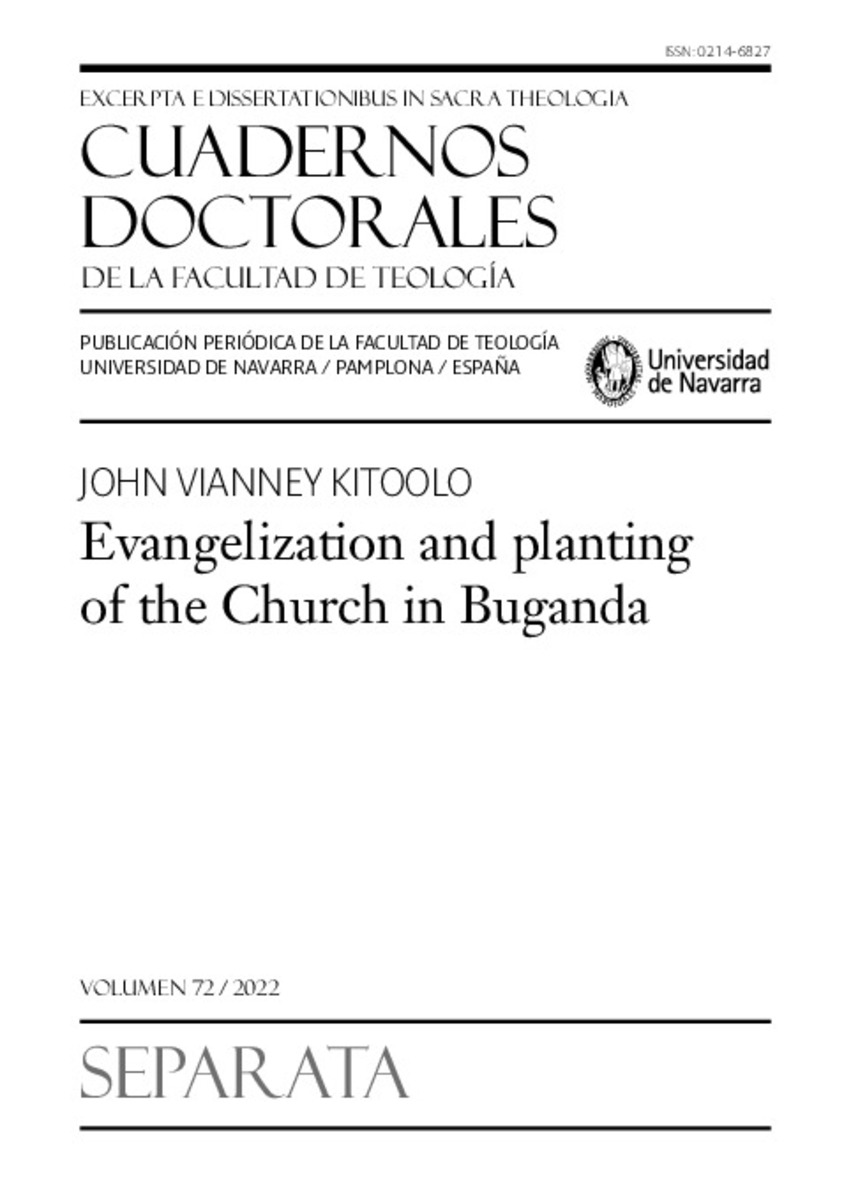Registro completo de metadatos
| Campo DC | Valor | Lengua/Idioma |
|---|---|---|
| dc.creator | Kitoolo, J.V. (John Vianney) | - |
| dc.date.accessioned | 2022-10-19T09:17:29Z | - |
| dc.date.available | 2022-10-19T09:17:29Z | - |
| dc.date.issued | 2022 | - |
| dc.identifier.citation | Kitoolo, J.V. (John Vianney). "Evangelization and planting of the Church in Buganda". Cuadernos Doctorales de la Facultad de Teología. Excerpta e Dissertiationibus in Sacra Theologia. 72, 2022, 367 - 433 | es |
| dc.identifier.issn | 0214-6827 | - |
| dc.identifier.uri | https://hdl.handle.net/10171/64505 | - |
| dc.description.abstract | This thesis intends to answer two questions: how the Catholic Church was planted in Uganda and how the first Christian community in Uganda lived its faith in the first nine years 1879 to 1887. The beginnings of the Catholic church in Uganda can be traced back in 1879 and counts on the initiative of two principal personalities: Mutesa the King of Buganda who made some considerable efforts to invite Christian missionaries and Lavigerie the founder of the Society of the missionaries of Africa who were the pioneer missionaries to Uganda. The course of history of this young church went through three successive periods; the first one being the arrival of the missionaries and beginning of evangelization which mainly focussed on the ruling class and the redeemed slaves, the second period covered the withdraw and absence of the missionaries and the emergency of a strong and vibrant lay apostolate and the last period was the times of trial marked by persecution and martyrdom. The planting of the church in Uganda can be considered as having been successful and the first Christian community understood to have lived to the fullness a life proper to that of a fully-fledged Church summarised in the celebration of sacraments and active witnessing. | es_ES |
| dc.description.abstract | Esta tesis pretende responder a dos preguntas: cómo se implantó la Iglesia Católica en Uganda y cómo la primera comunidad cristiana en Uganda vivió su fe en los primeros nueve años, de 1879 a 1887. Los inicios de la iglesia católica en Uganda se remontan a 1879 y cuenta con la iniciativa de dos personalidades principales: Mutesa el Rey de Buganda que hizo un esfuerzo considerable para invitar a los misioneros cristianos y Lavigerie el fundador de la Sociedad de Misioneros de África quienes fueron los misioneros pioneros en Uganda. El curso de la historia de esta joven iglesia en esta fase pasó por tres períodos sucesivos; el primero fue la llegada de los misioneros y el inicio de la evangelización, que se centró principalmente en la clase gobernante y los esclavos redimidos, el segundo período abarcó la retirada y ausencia de los misioneros y la surgencia de un apostolado laico fuerte y vibrante y el último período fue de los tiempos de prueba marcados por la persecución y el martirio. La implantación de la iglesia en Uganda puede considerarse un éxito y se puede decir que la primera comunidad cristiana vivió en plenitud una vida propia de una Iglesia plenamente constituida, resumida en la celebración de los sacramentos y el testimonio activo. | es_ES |
| dc.format.extent | 569 | es_ES |
| dc.language.iso | eng | es_ES |
| dc.publisher | Servicio de Publicaciones de la Universidad de Navarra | es_ES |
| dc.rights | info:eu-repo/semantics/openAccess | es_ES |
| dc.subject | Uganda | es_ES |
| dc.subject | Buganda | es_ES |
| dc.subject | Catholic church | es_ES |
| dc.subject | history | es_ES |
| dc.subject | Uganda Martyrs | es_ES |
| dc.subject | Iglesia católica | es_ES |
| dc.subject | historia | es_ES |
| dc.subject | Mártires de Uganda | es_ES |
| dc.title | Evangelization and planting of the Church in Buganda | es_ES |
| dc.type | info:eu-repo/semantics/article | es_ES |
| dc.publisher.place | Pamplona | es_ES |
| dadun.citation.endingPage | 433 | es_ES |
| dadun.citation.publicationName | Cuadernos Doctorales de la Facultad de Teología. Excerpta e Dissertiationibus in Sacra Theologia | es_ES |
| dadun.citation.startingPage | 367 | es_ES |
| dadun.citation.volume | 72 | es_ES |
Ficheros en este ítem:
Estadísticas e impacto
Los ítems de Dadun están protegidos por copyright, con todos los derechos reservados, a menos que se indique lo contrario.






